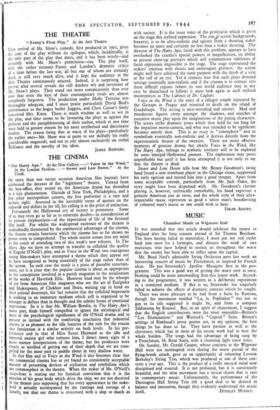MUSIC
Chamber Music at Wigmore Hall
IT was intended that this article should celebrate the return to England after his long sojourn abroad of Sir Thomas Beecham. The hero having failed to materialise, I must put my real cutlet back into store for a fortnight, and discuss the work of two musicians who have helped to sustain us throughout the worst that the enemy has been able to inflict upon the capital.
Mr. Boyd Neel's admirable String Orchestra gave last week an interesting concert of music by Frenchmen, or inspired by French ideas. He put Stravinsky's Apollon Musagete first in the pro- gramme. This was a good way of getting the worst over at once. Nothing could be more unrewarding than this jejune work. Accord- ing to the programme, it was written as a deliberate experiment in a restricted medium. If this is so, Stravinsky has singularly failed to achieve the effects of dramatic contrast which he sought.
There was more pleasure to be had from a Suite by Rameau, though the movement entitled "La, la, Popliniere" was not as gay as its title suggested it might be, and from a compact Sinfonietta by Roussel. But, in no spirit of chauvinism, I suggest that the English contributions were the most enjoyable—Britten's "Les Illuminations" and Warlock's " Capriol " Suite. Britten's settings of Rimbaud's prose poems are, in my opinion, the best. things he has done so far. They have passion as well as the cleverness which has in most of his recent work had to bear the whole burden. The songs had the advantage of being sung by a Frenchman, M. Rene Soria, with a charming light tenor voice.
On Sunday, Mr. Gerald Cooper, whose concerts at the Wigmore Hall were not interrupted even during the worst period of the flying-bomb attack, gave us an opportunity of rehearing Lennox Berkeley's String Trio, which was produced at one of these con- certs a year ago. This is the product of a really musical mind now disciplined and assured. It is not profound, but it is consistently beautiful, and the slow movement has a lyrical charm that is rare in contemporary music. Unfortunately, the performance of the Dartington Hall String Trio left a good deal to be desired in balance and intonation, though they evidently understood the music


























 Previous page
Previous page